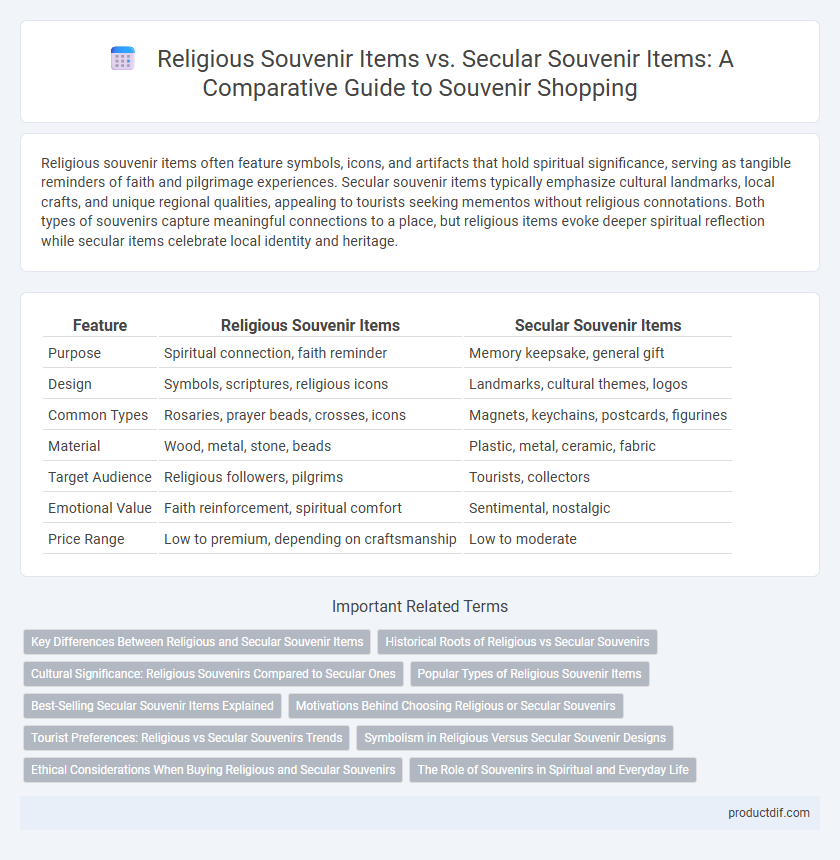Religious souvenir items often feature symbols, icons, and artifacts that hold spiritual significance, serving as tangible reminders of faith and pilgrimage experiences. Secular souvenir items typically emphasize cultural landmarks, local crafts, and unique regional qualities, appealing to tourists seeking mementos without religious connotations. Both types of souvenirs capture meaningful connections to a place, but religious items evoke deeper spiritual reflection while secular items celebrate local identity and heritage.
Table of Comparison
| Feature | Religious Souvenir Items | Secular Souvenir Items |
|---|---|---|
| Purpose | Spiritual connection, faith reminder | Memory keepsake, general gift |
| Design | Symbols, scriptures, religious icons | Landmarks, cultural themes, logos |
| Common Types | Rosaries, prayer beads, crosses, icons | Magnets, keychains, postcards, figurines |
| Material | Wood, metal, stone, beads | Plastic, metal, ceramic, fabric |
| Target Audience | Religious followers, pilgrims | Tourists, collectors |
| Emotional Value | Faith reinforcement, spiritual comfort | Sentimental, nostalgic |
| Price Range | Low to premium, depending on craftsmanship | Low to moderate |
Key Differences Between Religious and Secular Souvenir Items
Religious souvenir items often feature symbols, icons, or imagery specific to a faith, such as crosses, prayer beads, or statues of deities, serving spiritual or devotional purposes. Secular souvenir items typically emphasize cultural, historical, or tourist attractions like landmarks, local crafts, or regional motifs, focusing on memory or aesthetic appeal. The key difference lies in the intent; religious souvenirs hold sacred significance and are used for worship or remembrance, while secular souvenirs celebrate cultural heritage or personal experiences without spiritual connotations.
Historical Roots of Religious vs Secular Souvenirs
Religious souvenir items trace their historical roots to ancient pilgrimages and sacred sites where believers collected tokens symbolizing faith, such as rosaries, amulets, and prayer beads, reflecting deep spiritual significance. Secular souvenir items, emerging primarily during the rise of modern tourism in the 19th century, often commemorate cultural landmarks, historical events, or local artistry, exemplified by postcards, miniature monuments, and regional crafts. The distinction lies in religious souvenirs serving as personal relics of divine connection, whereas secular souvenirs function as mementos of cultural experience and heritage.
Cultural Significance: Religious Souvenirs Compared to Secular Ones
Religious souvenir items often carry deep cultural significance as they symbolize faith, spirituality, and sacred traditions tied to specific religious communities. Secular souvenirs, while culturally meaningful, typically represent broader historical events, landmarks, or local customs without a direct connection to religious beliefs. The cultural resonance of religious souvenirs can foster a sense of identity and reverence, whereas secular items emphasize heritage and collective memory.
Popular Types of Religious Souvenir Items
Popular types of religious souvenir items include rosaries, prayer beads, crucifixes, icons, and medals depicting saints or religious symbols. These items often serve as tangible reminders of spiritual experiences or pilgrimages to sacred sites. Religious souvenirs also encompass holy water bottles, prayer cards, and miniature statues of deities or religious figures, reflecting deep cultural and spiritual significance.
Best-Selling Secular Souvenir Items Explained
Best-selling secular souvenir items often include magnets, keychains, postcards, and T-shirts featuring iconic cityscapes, landmarks, or cultural symbols that appeal to a broad audience. These items offer affordable, lightweight, and easily packable memories of travel, making them popular among tourists seeking tangible reminders of their trips. Unlike religious souvenirs, which hold spiritual significance, secular souvenirs primarily serve as decorative keepsakes and conversation starters highlighting local heritage.
Motivations Behind Choosing Religious or Secular Souvenirs
Motivations behind choosing religious or secular souvenir items often center on personal beliefs and cultural significance, where religious souvenirs serve as tangible reminders of spiritual experiences or pilgrimages, reinforcing faith and devotion. Secular souvenirs are typically chosen for their association with travel destinations, aesthetic appeal, or as mementos of memorable experiences, reflecting personal interests or local culture without religious connotations. Consumers prioritize emotional connection and meaning, with religious souvenirs embodying sacred symbolism and secular items representing leisure, history, or local artistry.
Tourist Preferences: Religious vs Secular Souvenirs Trends
Tourist preferences for religious souvenir items often align with spiritual significance, such as cross pendants, prayer beads, or icons, reflecting a desire for meaningful mementos connected to faith. In contrast, secular souvenir items like postcards, keychains, and local crafts appeal to those seeking cultural or aesthetic reminders of their travels without religious connotations. Trends indicate a growing demand for personalized and artisanal secular souvenirs, while religious items maintain steady popularity in pilgrimage-heavy destinations.
Symbolism in Religious Versus Secular Souvenir Designs
Religious souvenir items often incorporate profound symbols such as crosses, prayer beads, or sacred texts that convey spiritual meaning and serve as reminders of faith and devotion. In contrast, secular souvenir designs typically feature landmarks, cultural motifs, or iconic imagery that represent personal memories and local heritage without spiritual significance. The symbolism in religious souvenirs aims to evoke reverence and contemplation, while secular items focus on celebration and identity related to place and experience.
Ethical Considerations When Buying Religious and Secular Souvenirs
Ethical considerations when purchasing religious and secular souvenirs include respecting cultural significance and avoiding exploitative commercialization. Religious souvenirs often carry spiritual meaning, requiring buyers to honor their sacred context and avoid items that commodify faith or disrespect traditions. Secular souvenirs demand mindfulness about environmental impact, fair trade practices, and support for local artisans rather than mass-produced goods.
The Role of Souvenirs in Spiritual and Everyday Life
Religious souvenir items, such as prayer beads, rosaries, and holy water bottles, serve as tangible connections to faith, providing spiritual comfort and cultural identity for believers. Secular souvenir items, including magnets, keychains, and postcards, capture memorable moments from travels and everyday experiences, symbolizing personal stories and shared memories. Both types of souvenirs play significant roles in preserving meaningful moments, whether through religious rituals or recreational activities, strengthening individual and collective identities.
Religious souvenir items vs secular souvenir items Infographic

 productdif.com
productdif.com